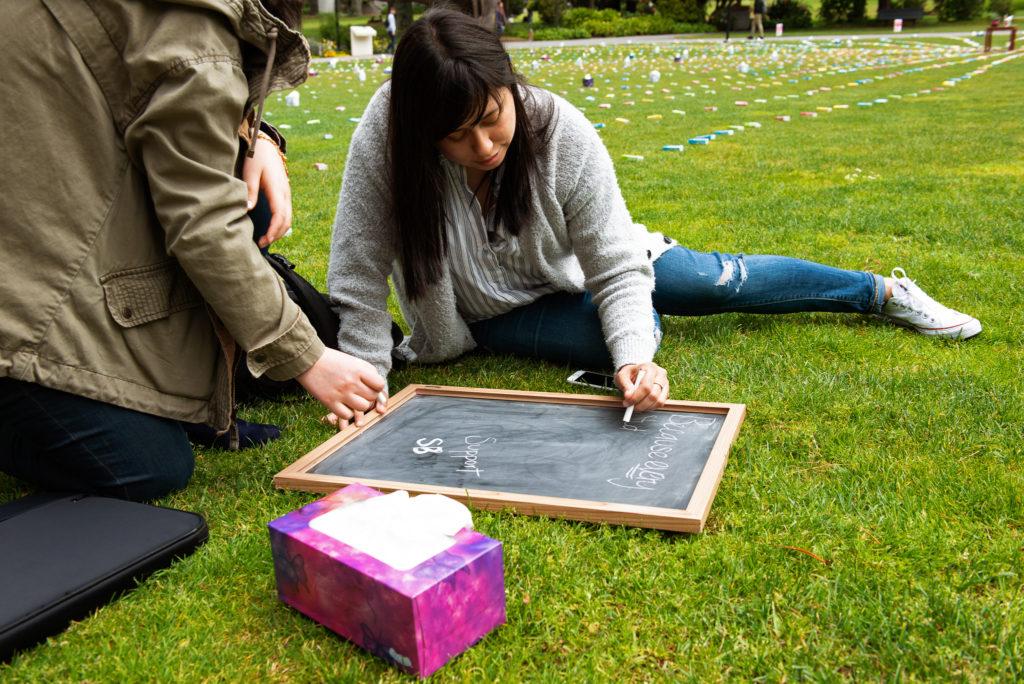The California Faculty Association is advocating the importance of mental health on California State University campuses with a traveling art display called Tissues for Issues.
Throughout the month of May, Tissues for Issues will be making single day stops at various CSU campuses to highlight the underinvestment of mental health within the CSU system.
The traveling art display, which consists of one large chair surrounded by 3,700 pocket tissues, appeared outside the Cesar Chavez Student Service Center on Wednesday.
Ron Hayduk, Political Science professor at SF State and CFA member, explained the representation of the Tissues for Issues display.

“There is one desk and one table for every 3,700 students,” said Hayduk “The tissues represent the tears that student’s shed in experiencing of stress and the many stressors of their lives.”
According to the International Association of Counseling Services, college campuses are recommended to have a ratio of one full-time accredited counselor for every 1,000-1,500 students. Currently, the Counseling and Psychological Services at SF State is understaffed, with a staff of only eight counselors.
SF State’s student to counselor ratio is 1-to-3,700 students.
Michael Ritler, a retired SF State counselor who worked on campus for 32 years, attended the art display to talk about the challenges SF State faces related to accredited counselors.
“There were times when the campus was fully staffed. . .We are down about half the number of counselors that we were 10 years ago,” said Ritler.
SF State Cinema major Sophia Rogers had to wait 3-4 weeks to get an appointment at the counseling center. She said she tried to see a counselor at the end of winter break last year but wasn’t given an appointment until a month later.
“I believe SF State really does need the extra assistance so students can have help when they need it, right when they need it, cause in the end we are all tired of waiting,” said Roger.
According to the National Alliance on Mental Illness, mental health is a leading cause of student dropouts, causing 64 percent of students to not continue their college education.
“Mental health issues are huge factors for people who don’t graduate and drop-out of school,” said Ritler. “Counseling is a huge factor in helping people to resolve those mental health issues and stay in school.”
Former Associated Students President Jackie Foley explained that there was a counseling and psych services resolution that went through the Associated Students Board of Directors at SF State this past year. The resolution focused on the student to counselor ratio and brought attention to the fact that SF State has one of the worst ratios in the CSU system.
“It’s not that our counseling and psych services themselves that are not wanting that [to meet the recommended ratio] it’s that the University is not putting the funds into more counselors and to more space,” said Foley.
The California State Legislature has focused on the issue and is trying to address the problem with a bill waiting to go to appropriations.
Senate Bill-968 is currently under review by the California State Legislature and, if passed, will mandate all CSU campuses to adhere to the recommended counseling ratio of one licensed mental health counselor per 1,000 students. The bill will go for appropriation on Monday, May 14.
SF State plans on asking to increase their counseling staff to 25 full-time accredited counselors to be able to better serve the college community if the bill is passed.
“Right now there is about 7 billion dollars in the State Treasury,” said Hayduk. “We have a huge surplus so whatever the cost is for the 25 counselors is modest.”







